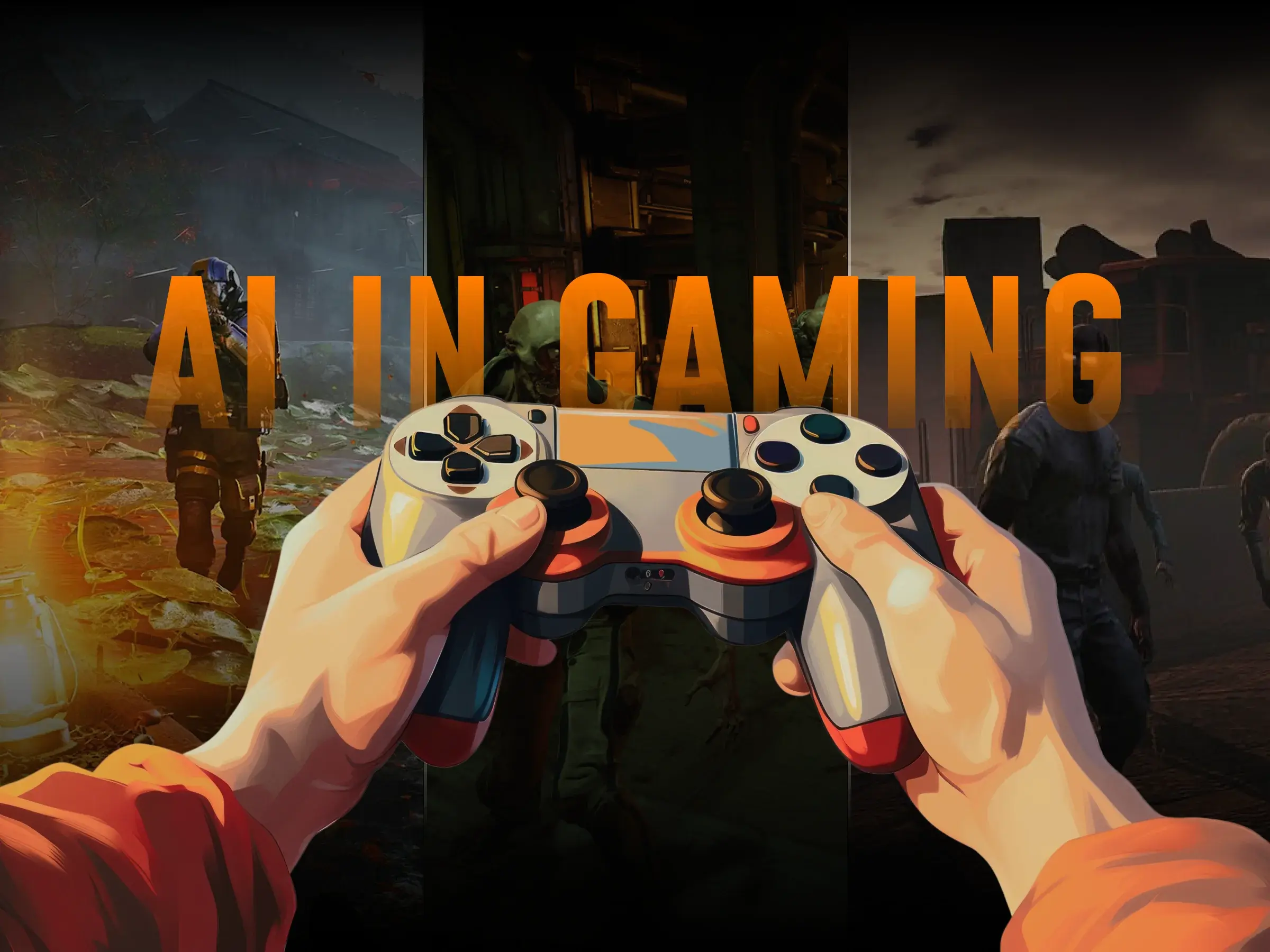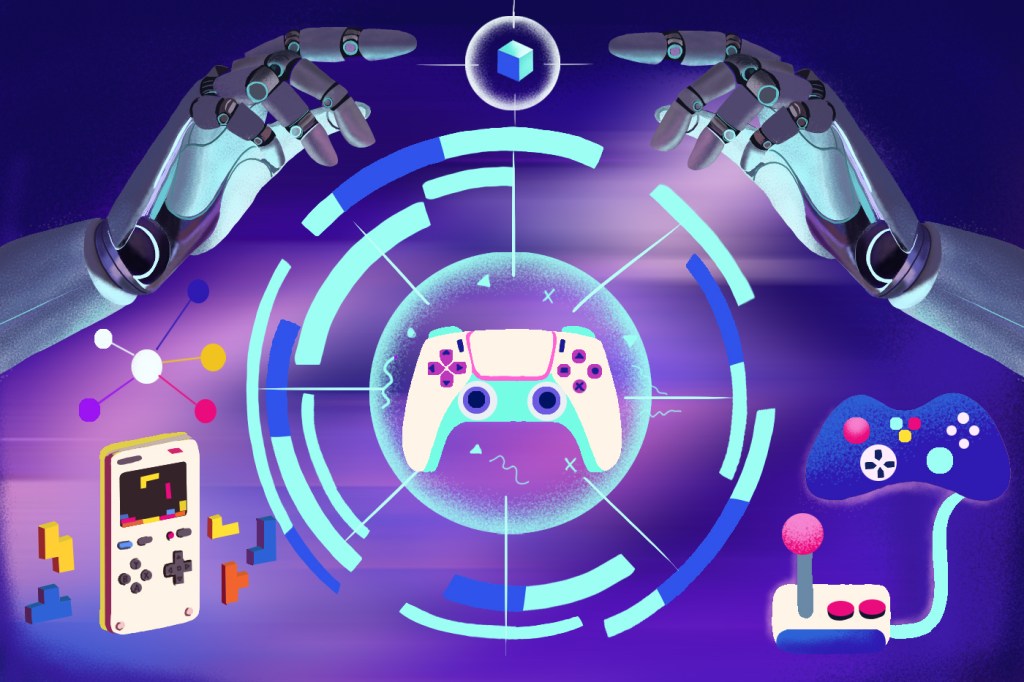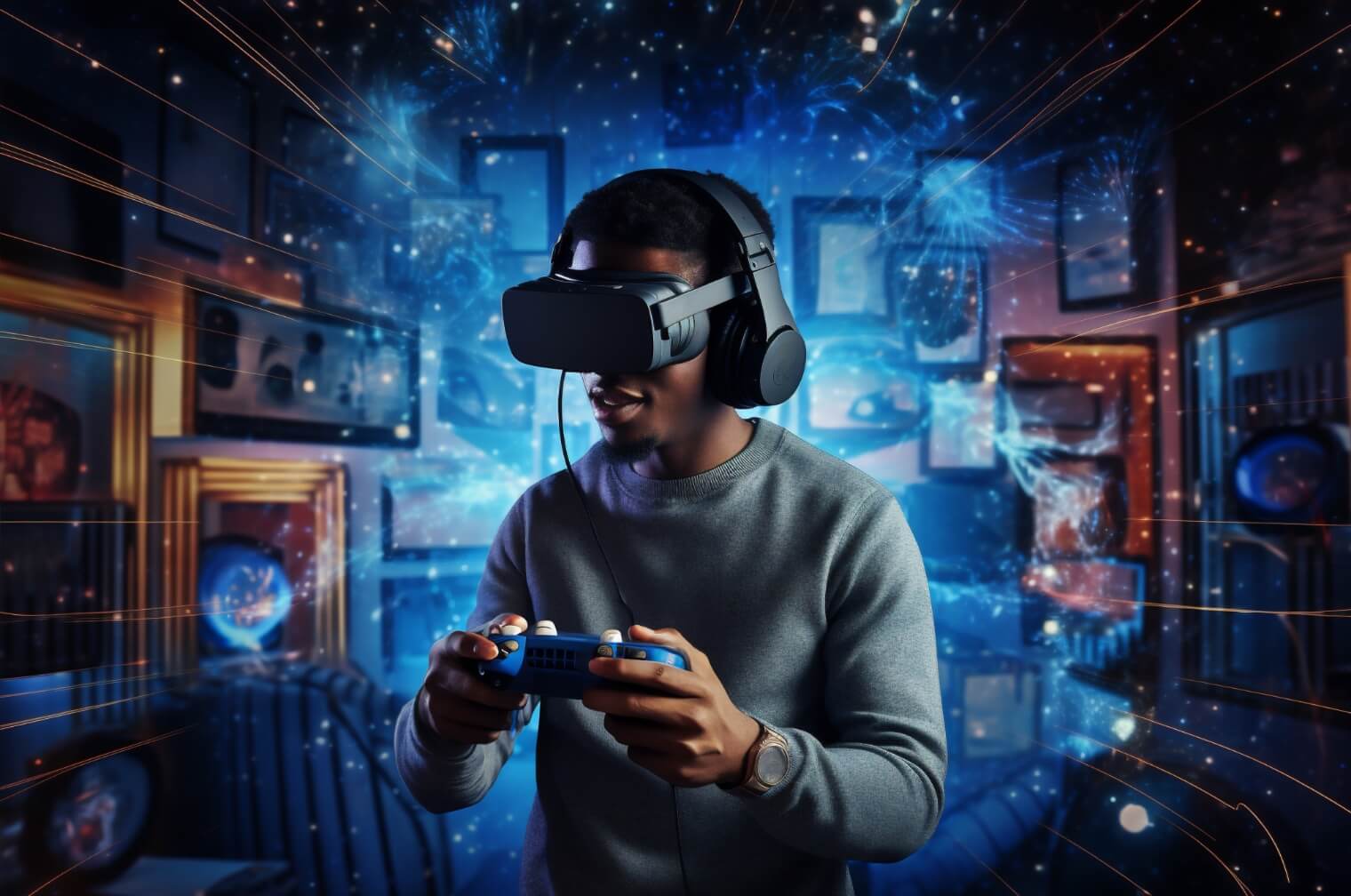AI Gaming is changing the way we play and design video games. It blends artificial intelligence with gaming for smarter, more engaging experiences.
Imagine playing against a game character that learns from you. AI gaming brings this reality to life. It uses complex algorithms to create intelligent behaviors in games. This means characters can adapt, learn, and evolve, making gameplay more dynamic. Developers also use AI to design better game worlds, enhancing realism and immersion.
As AI technology advances, the possibilities in gaming expand. From creating lifelike NPCs to personalizing player experiences, AI is at the forefront of gaming innovation. Let’s dive into how AI gaming is transforming the industry and what it means for the future of interactive entertainment.
Ai In Game Design
Artificial Intelligence (AI) is changing the world of gaming. It is making games more engaging and fun. AI in Game Design helps create better player experiences. It can make games smarter and more interactive. This blog will explore AI in game design, focusing on procedural generation and dynamic content creation.
Procedural Generation
Procedural Generation uses AI to create game content. This content is made automatically by algorithms. This saves time for developers. Procedural Generation can create vast worlds with unique landscapes. It adds variety to games.
Benefits of Procedural Generation:
- Endless possibilities: Every game session is different.
- Efficient content creation: Reduces manual work for developers.
- Enhanced player experience: Players explore new areas each time.
Games like Minecraft use Procedural Generation. Machine Learning helps improve these algorithms. Real-Time Analytics track player interactions. This data helps refine the content algorithms. Non-Player Characters (NPCs) can also be generated this way. This makes NPCs more dynamic and engaging.
Dynamic Content Creation
Dynamic Content Creation tailors game content to the player. AI adapts the game based on player actions. This creates a personalized experience. Adaptive Gameplay keeps players engaged. It adjusts the game difficulty in real-time.
Key aspects of Dynamic Content Creation:
- Real-Time Adjustments: Game changes with player actions.
- Personalized Experiences: Content matches player preferences.
- Improved Player Engagement: Keeps players interested longer.
Games like Left 4 Dead use this technique. Game Mechanics change based on player behavior. AI analyzes player actions with Real-Time Analytics. Immersive Environments are created using this data. This makes the game world feel alive. Adaptive Gameplay ensures every playthrough is unique and challenging.

Npc Behavior
Artificial Intelligence in gaming has changed how we play. Non-Player Characters (NPCs) now act more like real people. This makes games more fun and exciting. NPC behavior is now more complex and interesting. Let’s explore how AI makes NPCs interact and adapt in games.
Realistic Interactions
Realistic interactions make games more immersive. NPCs can now react to what players do. This creates interactive gameplay that feels real. NPCs can have conversations, show emotions, and even remember past events.
Some key features of realistic interactions include:
- Dynamic storytelling: NPCs can change the story based on your actions.
- Procedural content generation: This helps create new and unique NPC behaviors.
- Player behavior analysis: NPCs can understand and react to your play style.
These features make each game session unique. NPCs can now offer immersive experiences that keep players engaged. For example, in a virtual reality game, an NPC might react to your movements in real-time. This makes the game world feel alive.
Adaptive Ai Systems
Adaptive AI systems allow NPCs to learn and improve. They can adjust to how players play. This makes games more challenging and fun. Machine learning algorithms help NPCs to adapt over time.
Some important aspects of adaptive AI systems include:
- Learning from player actions: NPCs can change their behavior based on what players do.
- Adaptive difficulty: The game can become easier or harder depending on the player’s skill level.
- Personalized experiences: NPCs can offer unique challenges tailored to each player.
These systems make games more engaging. Players feel like they are part of a living world. Game design can now create NPCs that are smart and responsive. This leads to interactive gameplay that keeps players coming back for more.
Game Testing
Artificial intelligence (AI) has changed many fields, including gaming. Ai Gaming has opened new ways to create, test, and improve games. Game testing is a critical part of this process. It ensures games are free from bugs and offer a great user experience. Ai Game Testing uses smart tools and methods to make this easier and more efficient.
Automated Testing Tools
Automated testing tools are essential in Ai Game Testing. These tools help to quickly and efficiently test different parts of a game. They save time and reduce the chances of human error. Here are some popular automated testing tools:
- Unity Test Framework: This tool is great for testing games made with Unity. It helps check if game components work as expected.
- Unreal Engine Automation: This tool is used for games built with Unreal Engine. It allows for automated tests to find issues in the game.
- Appium: This tool is useful for testing mobile games. It supports multiple platforms and provides detailed reports.
Automated testing tools also use Neural Networks In Gaming. These networks can learn from past tests and improve future testing. They help in finding bugs that are hard to detect manually. Machine Learning In Gaming is another key area. It helps in predicting potential issues and resolving them before they affect players.
Bug Detection Techniques
Finding and fixing bugs is crucial in game testing. Various techniques are used to detect bugs effectively. Some of the most popular bug detection techniques include:
- Regression Testing: This technique checks if new changes have caused any old bugs to reappear.
- Load Testing: It tests how the game performs under heavy usage. This helps in finding bugs related to game performance.
- Exploratory Testing: Testers play the game in an unscripted manner. They try to find unexpected bugs and issues.
Player Behavior Prediction is another important aspect. It helps in understanding how players will interact with the game. Game Analytics gather data on player actions and use it to find patterns. These patterns help in identifying potential bugs. Intelligent NPCs and Adaptive Difficulty Systems use AI to adjust the game according to the player’s skill level. This ensures a smooth and enjoyable gaming experience.
Combining these techniques with Ai-Driven Game Design and Procedural Content Generation makes the testing process more efficient. Automated game balancing ensures that the game remains fair and fun for all players.

Player Experience
Artificial Intelligence (AI) is transforming the gaming world. By creating smarter games, it enhances the player experience. AI gaming adapts to each player’s style. This makes games more exciting and personalized. Let’s explore how AI is improving player experiences through personalized gaming and enhanced immersion.
Personalized Gaming
AI gaming creates personalized experiences for each player. It does this by analyzing player behavior. This is called Player Behavior Analysis. AI tracks how a person plays. It learns their strengths and weaknesses. Then, it adjusts the game to fit their style. This is known as Adaptive Gameplay.
Games with AI can change the storyline. This is called Dynamic Storytelling. Each decision a player makes can alter the game. This keeps the game fresh and exciting. Players feel more connected to the story.
Here are some benefits of personalized gaming:
- More engaging gameplay
- Higher player satisfaction
- Increased replay value
AI also improves User Experience Optimization. Games can become easier or harder based on the player’s skill level. This keeps the game challenging but not frustrating. Predictive Analytics in Gaming helps in anticipating player needs. This leads to better game design and happier players.
Enhanced Immersion
AI also enhances immersion in games. It does this through various techniques. One method is using Intelligent NPCs. These characters act more realistically. They react to the player’s actions. This makes the game world feel more alive.
Another method is Virtual Reality Integration. VR games use AI to create realistic environments. Players feel like they are inside the game. This level of immersion is unmatched. AI helps in creating more detailed and interactive worlds.
AI also aids in Game Design Automation. It helps developers create complex worlds quickly. This allows for more detailed and expansive game settings. AI can generate unique levels and scenarios. This keeps the game interesting for longer periods.
Here are some key points about enhanced immersion:
| Technique | Benefit |
|---|---|
| Intelligent NPCs | More realistic interactions |
| Virtual Reality Integration | Immersive environments |
| Game Design Automation | Complex and detailed worlds |
With the help of Artificial Intelligence in Gaming, players experience more immersive and personalized gameplay. Machine Learning Algorithms make this possible. AI continues to push the boundaries of what games can do. It offers players a richer and more engaging experience.
Ai-driven Analytics
Artificial Intelligence (AI) is transforming the gaming industry. AI-driven analytics are helping developers understand player behavior and improve game design. This technology allows for real-time data analysis, making games more engaging and enjoyable. Predictive modeling in games helps create adaptive gameplay, ensuring a personalized experience for each player. In this article, we will explore how AI-driven analytics provide valuable insights into player data and game performance.
Player Data Insights
Player data insights are crucial for understanding how users interact with games. By analyzing player behavior, developers can identify patterns and trends. This helps in creating a more engaging and enjoyable experience. AI-driven game design uses machine learning algorithms to gather and interpret this data.
Some key areas of player data insights include:
- User Engagement Metrics: Tracking how often players log in and how long they stay.
- Player Behavior Analysis: Understanding the choices players make and why.
- Enhanced Player Experience: Personalizing the game to suit individual preferences.
Real-time data analysis allows developers to make changes on the fly. This means that games can be updated to fix issues or add new features quickly. By understanding player data, developers can create games that keep players coming back for more.
Game Performance Metrics
Game performance metrics are essential for measuring the success of a game. These metrics help developers understand what is working and what needs improvement. AI-driven analytics provide valuable insights into game performance.
Some important game performance metrics include:
- Frame Rate: The smoothness of the game’s visuals.
- Load Time: How quickly the game starts and loads levels.
- Crash Reports: Frequency and causes of game crashes.
By analyzing these metrics, developers can ensure a high-quality gaming experience. AI-driven analytics can predict potential issues before they occur. This allows for proactive fixes and improvements. Adaptive gameplay, powered by artificial intelligence in gaming, ensures that the game remains challenging and fun.
In summary, AI-driven analytics are transforming the gaming industry. By providing insights into player data and game performance, AI helps create better games. The use of machine learning algorithms and predictive modeling in games ensures a personalized and engaging experience for all players.

Ethics In Ai Gaming
Artificial Intelligence (AI) has brought a significant change to the gaming industry. Artificial Intelligence in Gaming not only enhances player experience but also introduces new challenges. One such challenge is ensuring Ethical AI in Gaming. This involves addressing issues like fairness in gameplay and privacy concerns.
Fairness In Gameplay
Ensuring fairness in gameplay is crucial for maintaining a level playing field. Algorithmic bias in games can lead to unequal opportunities for players. This happens when machine learning algorithms favor certain types of players or strategies over others.
Key factors for fairness include:
- Dynamic difficulty adjustment: This ensures that the game adapts to the player’s skill level, providing a balanced challenge.
- Intelligent NPCs: Non-player characters that behave fairly and do not give an unfair advantage to any player.
- Game design optimization: Creating game mechanics that ensure fairness and equality.
Player experience enhancement is another aspect. Games should be enjoyable for all players, regardless of their skill level or experience. AI-driven game analytics can help identify and correct biases, ensuring a fair and enjoyable experience for everyone.
Privacy Concerns
Data privacy in gaming is a growing issue. Games often collect personal information from players, which can be misused if not properly managed. Protecting player data is crucial for maintaining trust and ensuring a safe gaming environment.
Key privacy concerns include:
- Data collection practices: Understanding what data is collected and how it is used.
- Data security: Ensuring that collected data is stored securely and protected from breaches.
- Player consent: Ensuring that players are aware of and agree to the data collection practices.
Implementing ethical practices in data collection and usage is vital. Ethical AI in gaming involves creating transparent data policies and giving players control over their information. This not only protects players but also enhances their trust in the game.
Future Trends
The world of gaming is changing fast. AI gaming is leading this change. Players are seeing new trends and technologies. These trends promise to make gaming more exciting. Future trends in AI gaming will shape how we play games. They will also change how we interact with virtual worlds. Let’s explore these trends.
Ai And Vr Integration
AI and VR integration is making games more realistic. Virtual Reality (VR) allows players to step into the game world. Artificial Intelligence (AI) makes this world smart and interactive. Together, they create an amazing experience.
Here are some ways AI and VR work together:
- Smart Characters: AI makes game characters act real.
- Dynamic Environments: AI changes the game world based on player actions.
- Personalized Experiences: AI adapts the game to each player’s style.
AI and VR also help in training and education. For example, flight simulators use VR and AI to train pilots. This technology is not just for fun. It has practical uses too.
Next-gen Gaming Experiences
Next-Gen gaming experiences are more than just better graphics. They offer new ways to interact with the game. AI makes games smarter. It makes them react to player choices. New technologies are also making games more immersive.
Here are some key features of next-gen gaming:
- Real-Time Feedback: Games adjust to players in real-time.
- Enhanced AI: Smarter enemies and allies in games.
- Cross-Platform Play: Play with friends on different devices.
Cloud gaming is another trend. It allows players to stream games without powerful hardware. 5G technology will make cloud gaming faster and smoother. This means more people can enjoy high-quality games.
AI and machine learning also help in game development. They create realistic animations and sounds. These technologies make it easier for developers to build complex games.
Popular Ai Games
AI Gaming is changing how we play and enjoy games. With the rise of Artificial Intelligence in gaming, players now experience more dynamic, challenging, and personalized gameplay. Popular AI games showcase the power of AI, making them stand out in the gaming world. Let’s dive into some of these breakthrough titles and the innovative gameplay mechanics they offer.
Breakthrough Titles
Several games have made significant strides with AI. These titles have set the bar high for others. Here are some noteworthy examples:
- The Last of Us Part II: Known for its AI-driven NPC behavior. Enemies react intelligently, making gameplay more unpredictable.
- No Man’s Sky: Utilizes procedural content generation. This creates vast, unique universes for players to explore.
- Alien: Isolation: Features an adaptive difficulty system. The alien learns from player actions, increasing the tension and challenge.
- StarCraft II: A prime example of real-time strategy AI. The AI opponents offer a tough challenge, even for seasoned players.
Innovative Gameplay Mechanics
AI is also introducing new gameplay mechanics. These innovations are enhancing immersive gaming experiences. Here are some key advancements:
- Player Behavior Analysis: Games like FIFA use this to adapt gameplay. It ensures each match feels unique and tailored to the player.
- Virtual Reality AI Integration: Titles such as Half-Life: Alyx bring AI into VR, creating more realistic interactions and environments.
- Game Testing Automation: AI helps developers by testing games. This ensures fewer bugs and a smoother gaming experience.
- Machine Learning Algorithms: Used in games like Dota 2, where AI learns and improves. This creates more challenging and engaging opponents.
Frequently Asked Questions
What Is Ai In Gaming?
AI in gaming refers to using artificial intelligence techniques to create responsive, adaptive, and intelligent behaviors in games. It enhances the gaming experience by making characters and environments more realistic.
How Does Ai Enhance Gaming?
AI enhances gaming by creating smarter NPCs, improving game graphics, and personalizing player experiences. It makes games more engaging and challenging.
What Are Examples Of Ai In Gaming?
Examples of AI in gaming include NPC behavior, procedural content generation, and adaptive difficulty. Games like “The Sims” and “FIFA” use AI extensively.
Can Ai Create Entire Game Worlds?
Yes, AI can create entire game worlds through procedural generation techniques. It allows for unique and expansive environments, enhancing replayability.
Conclusion
Ai Gaming offers endless possibilities for gamers and developers alike. It enhances gameplay and creates more engaging experiences. Players enjoy smarter opponents and better game dynamics. Developers save time with AI-driven tools. The gaming industry evolves with these advancements. AI continues to shape the future of gaming.
Stay tuned for more exciting developments. Dive into the world of AI Gaming and experience the difference today.

